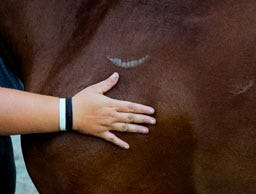How to Help a Dog with Separation Anxiety
Anxiety is a common topic these days, but did you know your dog may also feel some forms of anxiety, including separation anxiety? In this guide, we’re going to talk about what separation anxiety is, why it happens, how to recognise the signs as well as what anxiety treatments for dogs are available.
What is Separation Anxiety?
Separation doesn’t just affect dogs but can also occur in humans throughout their lives. For dogs, separation anxiety is defined as when they become distressed when they are apart from the person or people they trust. This is often a sign that the dog is hyper-attached to its people or it has suffered a traumatic incident in its life, such as the loss of a previous owner, moving house or divorce.

Common Signs of Separation Anxiety?
There are a few signs that occur if your dog is suffering from separation anxiety, which varies in severity, but their separation is marked by extreme and unusual behaviours, such as:
- Excessive barking/howling
- Shaking
- Pacing
- Urinating/defecating inside the house
- Chewing, digging, and scratching at furniture, walls, doors, etc.
- Try to escape
- Self-harm, such as compulsive biting, scratching or chewing
If you notice any of these signs in your dog, it’s important to consult your vet for further advice.
What Causes Separation Anxiety in Dogs?
Several things can cause separation anxiety in your dog, and by identifying the root cause, you can better find a way to help treat your dog for their anxiety. If you have a rescue dog and don’t know much about their background, it is a good idea to try out a variety of treatments and find what works for your dog.
Fear and Anxiety
The most obvious cause for your dog's separation anxiety is fear, and is common in puppies, rescue dogs and dogs who are hyper-attached to someone. This is because when your dog is away from you and will probably show behavioural issues such as howling, barking, shaking or urinating. If the root cause of your dog’s anxiety is fear, their symptoms will probably show as they notice you get ready to leave as they anticipate being left.
Boredom
Much like people, dogs need something to do to keep them occupied. While your dog might get lots of attention while you’re in the house, as soon as you’re gone, your dog no longer has anything to entertain them. This boredom can soon manifest itself into destructive energy and behaviours, such as:
- Chewing
- Ripping up furniture/ rubbish
- Howling
- Digging
- Trying to escape
Frustration
Like boredom, when your dog is left alone, they may feel they can’t do the things they need or want to do. This may be going outside to the toilet or eating, chasing animals they see in the garden or getting their owner's attention. This can quickly lead to attention-seeking behaviours such as barking, howling and scratching at doors or destructive behaviours as your dog tries to escape.
Which breeds are most likely to suffer from separation anxiety?
It is important to remember that any dog, regardless of their breed can experience separation anxiety as the root cause tends to have more to do with life experience and training than it does breeding.
That being said, some dog breeds have been specifically bred to be more social and dependent on human behaviours, which can lead them more prone to separation anxiety when they are away from their people. These breeds include:
- Labradors
- Cavaliers
- Toy Poodles
- Bichon Frise
There are also some breeds that are extremely high energy and need a lot of exercise and activity to keep them from becoming bored. These tend to be working dog breeds, such as:
- Collies
- Jack Russells
- Australian Shepherds
- German Shepherds
- German Pointers
- Vizlas
Other Behavioural Issues to Consider
While separation anxiety is a common occurrence in dogs, there are other behavioural issues to consider when looking to explain your dog’s problems.
- Puppy problems — young dogs are energetic and destructive by nature. They are also curious and like to chew things, but with proper training and distraction, they can grow out of these behaviours.
- Incomplete house training — Your dog may have an accident in the house if they are not as well house trained as you thought, especially if you leave them alone for too long without access to outside.
- Scent marking — This is a form of territorial behaviour that is usually seen in intact male dogs. Once your dog has been neutered, this behaviour should stop.
- Loud breeds — some dog breeds have been bred specifically to be more vocal than other dogs and so may need extra training to help quell their noisy natures. These breeds include dachshunds, Shih Tzus, beagles, huskies, and many kinds of terriers.

What to do if Your Dog Has Separation Anxiety?
Separation anxiety can be incredibly distressing for your dog and can lead to a lot of extra problems if left untreated, including the destruction of your home and injury to your dog. Separation-related problems have also become one of the most common reasons why owners relinquish a dog to a shelter or rescue. But this doesn’t need to be the case. Once you have found the root cause of your dog's separation anxiety, you can get started in helping them.
Will separation anxiety go away on its own?
Just like with an anxiety disorder in a human, separation anxiety in a dog is unlikely to go away on its own and you will need to work to help relieve your dog’s anxiety symptoms.
As we’ve mentioned above, some of these symptoms may not actually be anxiety-related and can be resolved with some basic training or time, such as puppy teething or bark training.
If your dog is lonely, then it can be beneficial to get another pet. However, this needs to be considered carefully while taking into account your current dog’s temperament as well as your lifestyle.
How to treat mild separation anxiety
If your dog is struggling with mild separation anxiety, then there are several things you can do to help. One of which includes the introduction of appeasing pheromones into your home that can help your dog to relax and understand that they are safe, such as the Adaptil Calm Diffuser, or by trying non-prescriptions dog calming medications.
If your dog is struggling with anxiety because they are bored or frustrated, you can try introducing stimulating toys that will keep them distracted and entertained. Toys that involve food can be the most effective as they entice your dog to play. Why not try filling a Kong Classic Dog Toy with frozen fillings to keep your dog licking and entertained?
Training your dog can also be a great way to alleviate some of their anxiety symptoms. Not only does this offer your dog mental stimulation, but it can also help you to slowly desensitise them to being alone. You can do this by:
- Teaching them to go to their bed or safe space
- Leave them in a different room and slowly build up their time alone. Return before their symptoms start and reward them for their good behaviour while alone.
You should never punish your dog when misbehaving, especially if their behaviour is related to anxiety. This can cause your dog to have a fear response to you and actually make their symptoms worse. Dogs respond best to positive reinforcement, so always make sure you reward their good behaviour.
How to treat severe separation anxiety?
If your dog's separation anxiety is severe, then their treatment can be a time-consuming endeavour. However, it’s entirely worth it for your and your dog’s quality of life. Plus, it can help build a stronger bond between you and your dog as you work to improve these issues. You can do this by:
- Follow the same training regime as mentioned above for mild anxiety, but take a slower approach.
- Work with a professional dog behaviourist. You will be able to find a reputable one through your vet.
- Prescription anxiety treatments which should be discussed with your vet.
- Use a dog sitter or doggy daycare so your dog doesn’t get left alone in the house.
Does Crate Training Help With Separation Anxiety in Dogs?
While crate training is important for providing your dog with their own safe space and also teaching them discipline, it is not an end-all cure for dogs with separation anxiety since it doesn’t address the root cause of your dog’s fear.
Crate training may lessen the impact of your dog’s symptoms (such as destroying furniture, accidents in the home and pacing), but you may cause your dog more distress over being alone by also having them in captivity.
Proper crate training your dog should be done to offer your dog a safe space to retreat to, but it should never be used as a punishment. If your dog has separation anxiety and you decided to crate train them, make sure that you are not exacerbating their anxiety symptoms by having them be in the crate.
If you think your dog may be suffering from separation anxiety and would like advice on what options you have before prescription treatments, please get in touch with us and a member of our friendly customer service team will be happy to help.
This post is an opinion and should only be used as a guide. You should discuss any change to your pet’s care or lifestyle thoroughly with your vet before starting any program or treatment.































